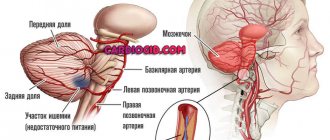The development of medicine and improvement of living conditions have significantly increased the life expectancy of older people in the modern world. These are our grandparents who are an integral part of the family dynasty. Most often, consciousness portrays them as wise, smiling, caring, rushing to support us in difficult times. But everyday life makes its own adjustments, and our older generation is susceptible to age-related diseases. These include dementia. To better understand the causes and methods of treating this disease, FAN talked with Candidate of Medical Sciences Yulia Telysheva , a neurologist at the Clinical Diagnostic Center on Belorusskaya.
What is dementia?
Dementia is a set of syndromes, a condition characterized by the gradual loss of human cognitive functions: perception, thinking, speech. As a rule, it develops in older people as a result of neurological diseases, vascular pathologies and leads to a number of unpleasant consequences - such as memory loss, loss or weakening of mental abilities, difficulties with recognizing loved ones and with orientation in space. Dementia patients are forced to stop working because they cannot cope with the workload, and in the late stages of the disease they are often unable to care for themselves at home on their own.
How does dementia progress in older people?
“Usually, dementia develops gradually, it can be divided into stages, each of them has its own symptoms and manifestations,” says Yulia Telysheva.
Experts call three degrees of dementia:
- light;
- average;
- heavy.
Signs of early dementia at the behavioral level - a person cannot remember what happened a couple of days ago, cannot remember names and titles, absent-mindedness appears and criticism of current events weakens. Such mild cognitive impairment makes social contacts difficult, but does not yet lead to complete dementia. Things are worse for those close to the dementia patient, because one of the important symptoms of the early period of the disease is low mood. A person becomes indifferent to loved ones, their experiences and problems, and may begin to suspect them of some unseemly actions directed against him.
A timely survey of the patient shows the presence of depressive moods several years before the initial stage.
What happens at the level of behavior in a patient at the second stage? All of the above cognitive impairments are getting worse. Plus, a person may no longer be able to navigate a familiar area or the time of day.
“The patient may stop feeling hungry and forget to eat. Has difficulty coping with simple arithmetic problems and confuses days of the week and dates. The patient may be haunted by auditory and visual hallucinations that are built into his daily life. He can start communicating with them and attract the attention of those nearby,” continues Yulia Telysheva.
The last degree of dementia varies in duration from several months to several years, it all depends on the immune system and the state of the cardiovascular system. At this stage, neurons are no longer able to exercise control over various body functions. The patient may fall into states of unmotivated aggression, causing harm to himself and those close to him.
Physical activity
A sedentary lifestyle leads to thinning of brain structures and deterioration of cerebral circulation. Physical activity prevents the development of hypertension, obesity, and reduces the risk of stroke. Dancing, which requires high-quality coordination, helps prevent memory deterioration.
For those who have retired, four types of exercise can be recommended: aerobic, strength, balance and flexibility.
Aerobic exercise should be performed for 30-60 minutes four times a week. The intensity of the workout should be 60-65% of the maximum heart rate. This level allows the body to produce hormones and other bioactive substances that trigger beneficial changes in the brain matter. If walking is chosen as an aerobic exercise, you should do it in the fresh air. Fresh air helps prevent peroxidation of lipids that make up neuronal membranes.
It is recommended to perform strength training twice a week. It is advisable to carry them out with a trainer to avoid sports injuries. Each exercise should be repeated 10-15 times.
Flexibility and balance. Yoga, martial arts, and Pilates enhance the benefits of strength and aerobic exercise. You can also choose tennis, any ball sports, or training with a jump rope.
What are the causes of dementia?
To date, research in this area of mental disorders does not provide clear answers to the question of the causes of its occurrence. There are more than 100 different diseases in the world that can trigger dementia. Currently, approximately 50 million older people suffer from cognitive impairment. This disease has become a serious problem in modern society. On the one hand, in most civilized communities the quality of life is improving and the age of survival is increasing, but on the other hand, there is always a danger that dementia will disrupt the active and full course of old age.
Among the causes of senile dementia are the following:
- hereditary factors: if the patient had sick people in his family, then the likelihood of getting sick in old age increases;
- Alzheimer's disease;
- hypertonic disease;
- atherosclerotic lesions of cerebral vessels;
- diabetes;
- excess weight, sedentary lifestyle;
- infectious and cardiovascular diseases.
Measures to prevent middle-aged dementia
As a rule, the loss of cognitive abilities in people 25-55 years old is caused by traumatic brain injuries, smoking, alcohol and drug abuse. Therefore, prevention of dementia in young and middle age consists of a categorical rejection of bad habits. The help of specialists (narcologists and neurologists) will help overcome psychological discomfort and allow the patient to socially adapt to the new reality.
“A person retains his mind as long as he wants it!” If you think about the statement of the ancient Greek philosopher, then in most cases it is true. And the popular wisdom: “Forewarned is forearmed!” will help the reader reduce the risks of neurodegenerative brain disorders.
At what age does dementia occur?
Dementia is called a disease of older people, but sometimes, although extremely rarely, this disease is also observed in younger people. Dementia in older people often develops as a result of or against the background of other disorders: degenerative, vascular, infectious, endocrine, autoimmune diseases, injuries, metabolic disorders, intoxications, brain tumors.
Dementia in younger patients - the so-called “early dementia” - can develop at 30-35 years of age. Fortunately, such patients make up only 15% of the total number of patients. Early pathology of cognitive functions occurs as a result of injuries or tumor changes in the brain, strokes, heart attacks, lack of certain vitamins and minerals in the body, thyroid dysfunction, and severe infectious diseases.
Initial signs
Dementia can begin at a young age, so it is important to pay attention to the initial manifestations to stop the progression of the pathology. Signs of cognitive decline:
- Deterioration in the ability to concentrate and maintain attention for a long time.
- Slower response to external stimuli.
- Bradyphrenia (slowing down of mental processes).
- Increased fatigue during mental stress.
- Difficulties in mastering new knowledge and skills.
- Intellectual rigidity (difficulty switching from one task to another).
- Deterioration of memory function.
Depending on the severity of manifestations, degrees of cognitive impairment are distinguished: involutional (associated with the natural aging process) changes, moderate cognitive dysfunction and dementia. Factors that provoke the progression of dementia in older people:
- Arterial hypertension.
- Hyperlipidemia (increased concentration of cholesterol and other lipid fractions).
- Diabetes.
- Lack of B vitamins.
- Lack of sex hormones (testosterone, estrogens).
- Hyperhomocysteinemia (increased concentration of homocysteine, which provokes increased formation of blood clots and venous embolism - blockage of veins).
- Heart failure.
- Disturbance of the respiratory system.
- Reduced intellectual activity.
- Sleep disorder, including those associated with sleep apnea (episodes of short-term breathing stops, which causes a lack of oxygen supply to the brain tissue).
- Genetic predisposition.
According to statistics, moderate cognitive dysfunction is detected in 15-20% of people over 60 years of age. Practice shows that 60-80% of patients with moderate cognitive dysfunction develop dementia within 5 years. In 20-40% of patients, cognitive impairment is stable or progresses slowly and does not reach the level of dementia.
Dementia, as one of the leading signs, is present in the clinical picture of such pathologies as Alzheimer's disease, the appearance of Lewy bodies in the brain (pathological protein fractions inside neurons), diseases of the cerebral vessels, leading to impaired blood supply to the nervous tissue.
Risk factors for developing dementia in young people include obesity, low level of education, decreased hearing acuity, and arterial hypertension. Modulated factors include diabetes mellitus, depression, bad habits (smoking, alcohol abuse), low physical activity, and a decrease in the number of social contacts. The development of cognitive dysfunction is influenced by a person’s lifestyle in general.
For example, dietary habits (consumption of fatty, salty foods) provoke pathologies of cerebral vessels (atherosclerosis), which in turn negatively affects the blood supply to nervous tissue and causes damage to brain cells. Prevention of dementia in old age is aimed at slowing down destructive, degenerative processes in brain tissue.
How to prevent dementia
Preventive measures to prevent dementia can be divided into medicinal and nonspecific. In any case, be sure to pay attention to the person’s lifestyle: nutrition, physical and mental activity, and social involvement of the person. It is believed, for example, that people who lead an active social life are less likely to suffer from dementia. For older people today, there are many opportunities for self-realization: attending lectures, health seminars, special events, participating in various programs to learn new skills. This can also include cultural programs - exhibitions, theme evenings, museums, special trainings.
It is imperative to monitor your weight, blood pressure and cardiovascular health, as well as your sugar levels. Do not abuse alcohol, uncontrolled use of medications and traditional medicine. Fill your daily life with mental activity: for example, solving puzzles and crosswords, reading books, and doing handicrafts.
Regular physical activity can also help prevent the progression of cognitive impairment. Both group and individual lessons are possible. Physical fitness is not so important: the main thing is that an elderly person spends time in the fresh air more often and gives moderate stress to his body. Physical activity can slow down pre-existing cognitive impairment in its early stages. The good effect of physical activity is especially noticeable in neurodegenerative and vascular disorders.
If one of your relatives suffered from dementia and you are aware of the hereditary predisposition, be prepared to form the so-called “cognitive reserve” at an early age. Increase the body's resistance to stressful situations and focus on physical and mental development. Increase your awareness in this area, do not neglect physical education and regular examinations.
Can dementia be prevented?
What are the risk factors for developing dementia? Does smoking cause or protect against dementia? What advice can you give to patients who would like to reduce their risk of dementia?
| Figure 1. Can lifestyle choices reduce the risk of dementia? |
The recent presentation of new drugs against dementia has attracted close public attention.
However, existing treatment with drugs of the previous generation, similar in action to the new ones, provides only limited relief of symptoms, sometimes slowing the progression of dementia over the course of a year. So there is currently no known drug that can stop the progression of dementia or prevent cognitive decline in old age. This, however, does not stop patients from seeking new information about ways to prevent dementia. Many people realize that medical breakthroughs are rare, and good health in old age is often attributed to a healthy lifestyle. Patients ask whether they can reduce their risk of developing dementia through certain lifestyle choices.
The purpose of this brief review is to examine the biological support for some useful recommendations.
In the absence of well-controlled randomized trials, there is no adequate basis for definitive conclusions. Epidemiological studies suggest that, as with heart disease, there are treatments that can be easily done at home that reduce the risk of dementia in old age, alone or in combination with other diseases.
The main risk factors for developing dementia in old age are: age over 75 years, female gender, diabetes, stroke, head injury, family history of dementia and/or Down syndrome, and possibly a history of depressive disorders.
As a rule, dementia in old age develops gradually, and about six years pass from its first manifestation to the death of the patient. The duration of any presymptomatic stage is difficult to determine, but according to some neurophysiological studies [1], the changes characteristic of Alzheimer's disease begin in the fourth decade of life. These symptoms gradually accumulate, causing the death of brain cells in areas responsible for memory function. Over time, the hypothetical symptom threshold is exceeded and signs of dementia appear.
On the contrary, neuroradiological studies show that brain volumes are well preserved in old age until there is a threat of dementia, which is presumably associated with a catastrophic decrease in the brain regions of neurons responsible for memory.
Preventive measures do not seem to work if the process of dementia has already begun. If the data from neuropathological studies, according to which senile dementia begins in middle age, are correct, then it makes sense to prevent dementia at the age of 40–50 years. However, if the onset of brain decline in old age is correctly established neuroradiologically, then preventive measures can be successful even in very elderly people without dementia.
An important component of neuronal degeneration is the age-related predominance of neuronal damage processes over the brain’s own reparative processes (the “wear and tear” hypothesis). Ways are being developed to implement neuroprotective strategies to support neurons during midlife and old age.
- Cerebrovascular diseases
It has not yet been proven that cerebrovascular disorders lead to a decrease in mental abilities in old age. Dementia often begins after a stroke; This may be a common mechanism for the development of vascular dementia. Cerebrovascular changes alone or in combination with Alzheimer's disease are likely responsible for 25-50% of all late-onset dementias. Risk factors for cerebrovascular diseases are well known (hypertension, smoking, obesity, hyperlipidemia, family history of stroke, diabetes, unbalanced diet). Addressing such factors clearly reduces the risk of stroke/vascular dementia in older adults [3] and may have beneficial effects in patients with already impaired cognitive function [4].
Correction of hypertension does not lead to a deterioration in mental performance even in people with cognitive impairment (hypertension is not inherent in the old brain), therefore, there is reason to control even a moderate increase in blood pressure in older people [5].
- Diabetes
The vascular complications associated with diabetes are well known, so it is not surprising that there is a link between diabetes and dementia. Neuropsychological studies reveal deficits in unstable, insulin-dependent diabetes, possibly due to mechanisms of damage to the vascular endothelium. The Rochester Registration Sheet provides a highly accurate estimate of the increased risk of developing Alzheimer's disease with adult-onset diabetes (relative risk 2.3% for men, 1.4% for women).
Treating diabetes in old age reduces the risk of developing vascular dementia and possibly Alzheimer's disease. A special diet, dosed exercise, oral hypoglycemic agents and insulin provide effective treatment. Any program to prevent dementia should include the identification and treatment of patients with unrecognized diabetes who should achieve recovery of cognitive function as a result of therapeutic intervention.
Hormone replacement therapy (HRT). There are age-dependent changes in the hormonal regulation of glucose metabolism, which may be associated with changes in insulin sensitivity and increased production of growth hormone.
In addition, estrogen production in women is significantly reduced. The beneficial effects of estrogen replacement therapy include a reduced risk of osteoporosis, coronary artery disease, stroke, and even Alzheimer's disease.
| Figure 2. Possible strategies to prevent dementia |
Some early studies supported the use of estrogens in older women with dementia, even before it was established that the use of estrogens during periods of increased risk of developing Alzheimer's disease significantly reduces the likelihood of developing Alzheimer's disease [7, 8].
Currently, the effectiveness of HRT in the treatment of already developed Alzheimer's disease is being tested, and large-scale studies are being conducted in elderly women who have undergone HRT, including those who have found a decline in mental abilities as a result of treatment. Thus, it is too early to talk about improving mental processes as a potential effect of HRT along with the prevention of osteoporosis and vascular diseases.
- Smoking
Smoking is an undoubted risk factor when it comes to the development of a number of diseases in old age, including cancer and atherosclerosis. The latter increases the risk of developing vascular dementia and cognitive disorders in old age due to increased atherosclerosis and worsening hemodynamic processes.
However, some studies indicate a possible reduction in the risk of developing Alzheimer's disease with smoking in old age. A small number of clinical studies on the use of nicotine or its agonists also support the positive effect of nicotine in the treatment of Alzheimer's disease and allow smoking to be considered as a protective factor in dementia.
A large-scale study known as the Honolulu Heart Program [9], involving 3429 Japanese and American subjects, found a positive correlation between smoking in midlife and the risk of cognitive decline in later life. In this group, long-term abstinence from smoking had a beneficial effect on mental processes.
- Nutrition
Pathological mechanisms of Alzheimer's disease may include oxidative stress and the accumulation of free radicals, which, in turn, can lead to excessive lipid peroxidation, disruption of the integrity of neuronal membranes and gradual death of brain cells.
Research into nutritional factors has found a link between diet and cognitive decline in old age. At the same time, the subjects kept so-called “food diaries”, in addition, they had measurements of the concentration of micronutrients in the blood. Factors such as poverty and smoking are associated with an increased risk of stroke, which may explain increased aging of the brain and destruction of endothelial membranes.
Cerebrovascular disease is associated with an increased risk of strokes and vascular dementia. Diet can help prevent these diseases, although, of course, it is often difficult to separate “healthy eating” from “healthy lifestyle.”
However, the fact that different studies (food diaries and changes in plasma concentrations of substances) led to largely the same conclusions suggests the important role of diet in preventing the deterioration of mental processes and, possibly, dementia. W. Gilman et al found that when lifestyle factors were taken into account, eating fruits and vegetables reduced the risk of stroke.
Similarly, R. Gale et al studied the relationship between cause of death, cognitive function in old age and certain living conditions, including diet. They concluded that cerebrovascular disease is not the last cause of mental impairment in old age, and vitamin C intake “may protect against both mental impairment and cerebrovascular disorders.”
The concentration of antioxidants in blood plasma largely predicts the preservation of cognitive function in old age. This is evidenced by data from a 22-year study of patients' lifestyles. Eating vitamin C and beta-carotene, found in fruits and vegetables, and alpha-tocopherol (vitamin E) was associated with cognitive test performance in older adults.
High dietary intake of polyunsaturated fatty acids (such as linoleic acid) or insufficient intake of antioxidants can cause oxidative stress and predispose to atherosclerosis. In a study of 390 very old people between 1990 and 1993, these factors were found to increase the risk of cognitive decline.
In addition, a link has been found between increased intake of linoleic acid and decreased mental performance. An inverse relationship has been found between fish consumption and cognitive decline, although antioxidants (vitamins A, C and E) have not been shown to have any protective effect on cognitive function.
Another epidemiological study of 137 older adults provided further evidence of the role of diet in preventing cognitive decline in old age, but did not isolate the same micronutrients. High past intakes of vitamins A, C and E were associated with better performance on specific neurophysiological tests.
There is also evidence from one randomized trial that examined the effects of vitamin E supplementation (2000 IU/day) in the treatment of Alzheimer's disease. Before treatment, there were no differences between the control and treatment groups, but a course of vitamin E was enough to slow the progression of dementia by an average of eight months.
- Nonsteroidal anti-inflammatory drugs
A connection has been established between cerebrovascular diseases and decreased thinking abilities, so it is advisable to use aspirin to prevent dementia. The antiaggregation properties of aspirin prevent transient ischemic attacks and thrombosis by affecting the mechanisms involved in the prevention of vascular dementia.
The East Boston Elderly Health Project conducted a study of 3,809 people. It made it possible to prove that as a result of the administration of aspirin, there is some improvement in cognitive function. It has been suggested that if aspirin is used at higher anti-inflammatory doses rather than at low antithrombotic doses, the drug's effect on improving cognitive function is increased.
Epidemiological studies indicate that chronic use of non-steroidal anti-inflammatory drugs reduces the risk of cognitive impairment in old age. Indomethacin improves short-term memory in healthy older adults, according to one clinical study.
Table 2. Neural protective factors and dementia
Risk Reduction
Putative neuroprotective agents
|
R. Rozzini et al (1996) found a similar relationship when studying data from epidemiological studies of older people from various population groups (Established Populations for Epidemiological Studies of the Elderly - EPESE). Selection was made based on age, gender, education, presence of cerebrovascular diseases and hypertension. The relative risk of developing Alzheimer's disease was found to be lower among those who chronically take NSAIDs (relative risk was 0.82).
Scientists who conducted a study in a group of elderly people in Baltimore associated a reduced risk of developing Alzheimer's disease with increased use of NSAIDs. It's time to conduct a massive study of preventive measures to combat risk factors for cerebrovascular disease, as well as the possibilities of NSAIDs and some other drugs, such as hormones and nutritional supplements.
Testing of cognitive function should be routine in the clinical assessment of the elderly patient, regardless of whether cognitive function is impaired or not. If a violation is detected, the most likely cause is determined and appropriate medications are prescribed.
The latter may include anti-dementia drugs (donepezil is the most widely available in the UK, with other similar drugs due to be available soon), but more often than not, simpler drug adjustments are required.
Some patients report a subjective feeling of impaired cognitive function or are overly concerned about the possibility of developing dementia due to older age or the fact that a close relative has dementia. Factors that increase the risk of developing dementia have been described in many studies.
In such cases, it is advisable to give the patient some advice. Firstly, it is necessary to constantly monitor the condition of the blood vessels and, if vascular risk factors are detected, carry out treatment. Secondly, in the absence of contraindications, the possibility of HRT is considered in all elderly patients. The benefits of HRT are greater than the risk of adverse effects, so there is currently no compelling reason to avoid this method in older women at risk of developing dementia.
Thirdly, all patients need counseling regarding proper nutrition, even if the patient’s diet is obviously of high quality. In old age, due to the increasing need of the aging brain for reparative substances, a deficiency of micronutrients (antioxidants, w-3 fatty acids) develops.
Finally, you should consider NSAIDs. Aspirin (at doses that achieve anti-inflammatory activity) and other NSAIDs, when well tolerated, have the potential to reduce the risk of dementia.
References
1.
Braak H., Braak E. Staging of AD's related neurofibrillary changes // Neurobiology of Aging l995;
16(3): 271-278. 2.
Fox NC, Freeborough PA, Rossor MN Visualization and quantification of rate of atrophy in Alzheimer's disease // Lancet 1961M8 (9080): 82-30.
3.
Hachinski V. Preventable senility: A call for action against the vascular dementias // Lancet 1992;
340:645-647. 4.
Starr JM, Whalley LJ, Deary IJ The effects of anti-hypertensive treatment on cognitive function;
results from the Hope study // J. Am Geriat Sac 1996; 44:41 1-415. 5.
Prince MJ, Birt AS, Blizzard RA et id.
Is the cognitive function of older patients affected by antihypertensive treatment? Results from 54 months of the Medical Research Council's treatment trial of hypertension in older adults // BMJ 1996; 312:801-803. 6.
Leibson CL, Rocca WA, Hanson VA et al Risk of dementia among persons with diabetes mellitus: a population-based cohort study // Amer.
J. Epidemiol. 1997; 145(4): 301-308. 7.
Bonn D. Oestrogen offers protection in Alzheimer's Disease // Lancet 1997;
349: 1889. 8.
Tang MX, Jacobs D, Stern Y et al.
Effect of estrogen during menopause on risk and age at onset of Alzheimer's Disease // Lancet 1996; 348: 429-432. 9. Galanis DJ, Petrovitch H., Launer LJ et al. Smoking history and middle age and subsequent cognitive performance in elderly Japanese-American men. The Honolulu-Asia Aging Study // Amer. J. Epidemiol. 1997; 145(6): 507-515.
Can dementia be cured?
As noted above, at present doctors can only identify dementia in the early stages and do everything possible to slow down the development of this disorder by offering an appropriate treatment method. The main emphasis is on stabilizing the condition of an existing mental disorder.
In this case, the sooner the patient seeks help and examination, the more optimistic the prognosis. Monitor changes in the behavioral sphere of your elderly loved ones and at the first signs of memory loss, weakening of concentration, impaired speech functions, loss of orientation in space, difficulties in switching from one task to another, seek medical help. Treatment will be prescribed individually and under the supervision of specialists. An elderly person with suspected mental disorders will be tested for dementia and the characteristics of the current period will be identified.








